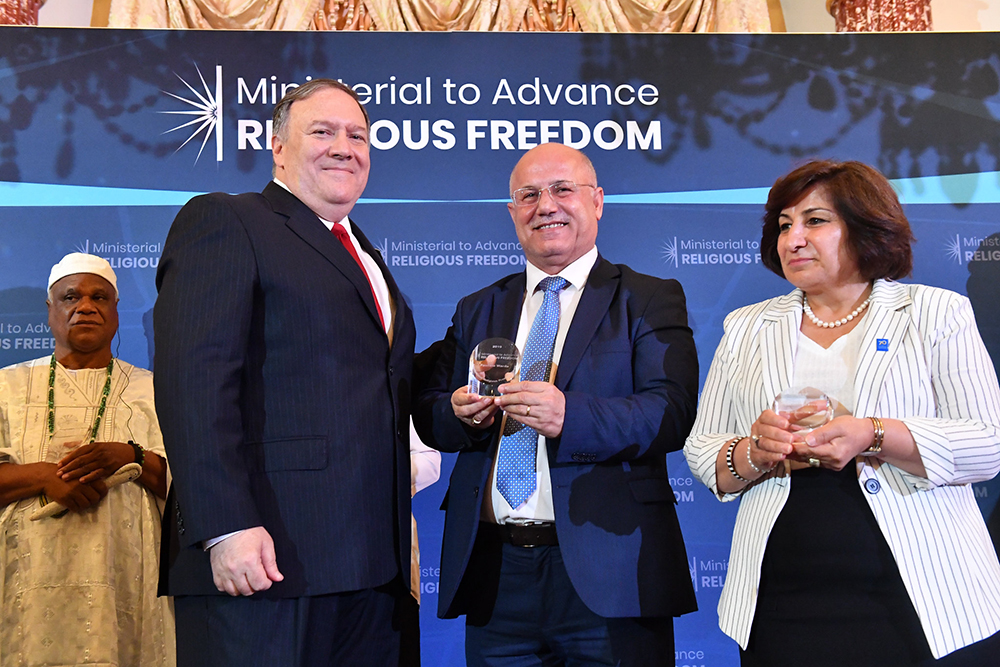There are 200 Asia Bibis in Pakistani jails
US State Department reports on religious freedom around the world
The Christian world prayed hard, and Asia Bibi – imprisoned in Pakistan on charges of blasphemy arising from a dispute over drinking water – was released when that nation’s Supreme Court upheld her innocence.
But citing “civil society reports” about Pakistan, the US State Department says there are “at least 77 individuals imprisoned on blasphemy charges, at least 28 of whom had received death sentences, although the government has never executed anyone specifically for blasphemy”.
“A grassroots movement for religious freedom is beginning to take hold around the world …” – Sam Brownback
According to Voice of the Martyrs, the situation is even worse, with its partners in Pakistan reporting more than 200 similar cases of imprisonment.
Eighty per cent of the world’s population live in nations where religious freedom is restricted. That’s just one of the stats highlighted at a special three-day event – the ‘Ministerial to Advance Religious Freedom‘ – hosted by the US State Department. Its 2018 Report on Religious Freedom includes updates on every country in the world.
While persecution of Christians is getting worse, “the ministerial’s concerns are broadly ecumenical, ranging from the minority Cao Dai in Vietnam to Jews in Yemen,” the Wall Street Journal reports. It even includes non-believers such as Rafida Bonya Ahmed, whose husband was killed by machete-wielding Islamists in Bangladesh because of the couple’s secular humanist views. She was severely wounded in the attack.
The US government announced a major push for religious freedom at the Ministerial event. “We will not stop until we see the iron curtain of religious persecution come down; until governments no longer detain and torture people for simply being of a particular faith or associated with it; until people are no longer charged and prosecuted on specious charges of blasphemy; until the world no longer believes it can get away with persecuting anyone of any faith without consequences,” promised Sam Brownback, US Ambassador-at-Large for Religious Freedom.

US Secretary of State Michael Pompeo with William Ward and Pascale Warda of Iraq at the 2019 International Religious Freedom awards US State Dept/Flickr
He added: “A grassroots movement for religious freedom is beginning to take hold around the world … Pakistan released Asia Bibi after their Supreme Court upheld her acquittal of blasphemy charges. And as Secretary [Mike] Pompeo said, Uzbekistan, for the first time since 2006, is no longer a Country of Particular Concern.”
Here are some country reports from the US State Department’s survey:
Pakistan: Media reported that a district judge sentenced to death two Christian brothers from Lahore – Qaisar and Amoon Ayub – on December 13 for insulting the Prophet Mohammed in articles and portraits posted on their website in 2010. The brothers have been in Jhelum Prison since 2014.
In January, authorities in Lahore arrested two young Christian cousins, Patras and Sajid Masih, for alleged blasphemy after protesters threatened to burn them and their family home with petrol.
Family members said Patras Masih had been framed for blasphemy on social media when he took his mobile phone to a repair shop, while a media report said he got into a dispute with Muslim youths over a cricket match.
Two men had fabricated a recording of what was termed blasphemous speech and attempted to use it to extort money.
Sajid Masih was severely injured after jumping from the fourth floor window of an FIA (Federal Investigation Agency) interrogation room. According to media reports, he said police tortured him and ordered him to sexually assault his cousin, and he leaped out the window to escape. Patras Masih remained in custody, and many Christian families fled the neighbourhood.
In October, police arrested a Muslim man in Sadiqabad, Khanewal District, Punjab, who claimed to be the “11th Caliph.” Police arrested the man and charged him with blasphemy after videos of his statements circulated online. At year’s end, he was awaiting trial.
Courts did overturn some blasphemy convictions upon appeal, after the accused spent years in prison. On March 13, Punjab provincial judges acquitted Christian school director Anjum Sandhu of blasphemy after an Anti-Terror Court (ATC) sentenced him to death in 2016. According to media reports, two men had fabricated a recording of what was termed blasphemous speech and attempted to use it to extort money from Sandhu. When Sandhu went to police to register a complaint of extortion, police had demanded more money from Sandhu and brought a blasphemy case against him.
According to NGOs and media reports, individuals convicted in well-publicised blasphemy cases from previous years – including Nadeem James, Prakash Kumar, Taimoor Raza, Mubasher, Ghulam, and Ehsan Ahmed, Sawan Masih, Shafqat Emmanuel, Shagufta Kausar, Sajjad Masih Gill, and Liaquat Ali – remain in jail and continue to await action on their appeals.
In February, an ATC convicted 31 individuals for their role in the 2017 killing of university student Mashal Khan for alleged blasphemy. The ATC sentenced the primary shooter to death, five others to life in prison, and 25 individuals to four years’ imprisonment.
The Peshawar High Court later suspended the sentences and released on bail the group of 25.
Nigeria: There have been incidents of violence reflecting tension between different ethnic groups involving predominantly Muslim Fulani herders and predominantly Christian farmers.
Scholars and other experts have assessed that ethnicity, politics, and increasing competition over dwindling land resources are among the drivers of the violence, but religious identity and affiliation are also factors. In January and May, Fulani herdsmen attacked several villages in northern Benue State, resulting in the deaths of more than 200, mostly Christian, Tiv farmers.
During the year, clashes between farmers and herders in Adamawa and Taraba States resulted in more than 250 deaths.
In June, Fulani herdsmen attacked several villages in Barkin Ladi Local Government Area (LGA) of Plateau State, killing about 200 ethnic Berom farmers. The following day, Berom youth set up roadblocks and killed dozens of Muslim passers-by.
In March, the Nigerian Inter-religious Council (NIREC), which includes the nation’s most influential religious leaders and addresses interfaith collaboration, met for the first time in five years.
United Arab Emirates: In January, a court sentenced a Dominican woman and her child’s Yemeni biological father to a suspended one-month jail term and deportation for violating the country’s interpretation of sharia by engaging in extramarital sex. Police and courts continued to enforce laws against sorcery.
In February, the federal Supreme Court upheld an 18-month jail term against someone identified in the press as “an Arab man” for charges of witchcraft, fraud and trying to coerce sex from a woman.
There were reports of government actions targeting the Muslim Brotherhood, designated by the government as a terrorist organisation, and people associated with the group.
Inside prisons, authorities required Muslims to attend weekly Islamic services.
In Abu Dhabi, some Christian clergy reported difficulties visiting Christian prisoners and raised concerns about lack of worship space for incarcerated Christians. They reported that when they were granted prison access, they were permitted to take Bibles to the prisoners.
Indonesia: The constitution guarantees freedom of religion and the right to worship according to one’s own beliefs, but it states that citizens must accept restrictions established by law to protect the rights of others and to satisfy “just demands based upon considerations of morality, religious values, security and public order in a democratic society.”
In separate incidents, four people received prison sentences ranging from 16 months to five years for violations of blasphemy laws.
In Medan, a court sentenced an ethnic Chinese woman to 18 months in prison after she complained about the loudspeaker volume of a neighbourhood mosque.
In Aceh, authorities continued to carry out public canings for sharia violations, such as selling alcohol, gambling and extramarital affairs.
In July, the Constitutional Court dismissed a petition brought by members of the Ahmadi Muslim religious community to revoke the blasphemy law.
In Aceh, authorities continued to carry out public canings for sharia violations, such as selling alcohol, gambling and extramarital affairs. The Governor issued a directive to end canings in public, over the strong objections of others in the government and society. The directive remained in effect, but no districts enforced it, due in part to the arrest and detention of the Governor.
Some local governments imposed local laws and regulations restricting religious freedom, such as local regulations banning Shia or Ahmadi Islamic practice.
Ahmadi Muslims again reported incidents of forced conversion and discrimination.
Media and human rights groups reported in December that Jakarta’s Prosecution Office launched a smartphone app called Smart Pakem, allowing citizens to file heresy or blasphemy reports against groups that carry out what the government considers unofficial or unorthodox religious practices.


